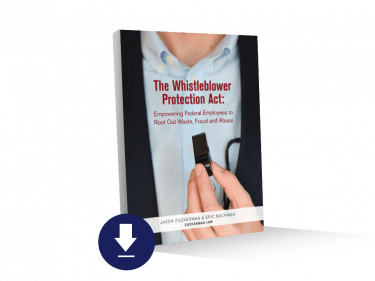PROVING RETALIATION FOR EXERCISING WHISTLEBLOWING, COMPLAINT, APPEAL, OR GRIEVANCE RIGHTS UNDER WPA SECTION 2302(B)(9)
To prove retaliation for exercising whistleblowing, complaint, appeal, or grievance rights under Section 2303(b)(9), an employee must prove, by a preponderance of the evidence, the following four elements:
- The employee (or someone identified with the employee) engaged in a protected activity (see Protected Activity Under Section 2302(b)(9)).
- The agency took, failed to take, or threatened to take a personnel action (see Personnel Actions Under Section 2302(b)(9)).
- The official responsible for the personnel action had knowledge of the employee’s protected activity (see Knowledge Under Section 2302(b)(9)).
- There was a causal connection (or nexus) between the employee’s protected activity and the personnel action (see Causation Under Section 2302(b)(9)).
The WPEA split Section 2302(b)(9)(A) claims into two subcategories:
- Section 2302(b)(9)(A)(i). This subsection involves the exercise of appeal, complaint, or grievance rights that deal with remedying a violation of Section 2302(b)(8).
- Section 2302(b)(9)(A)(ii). This subsection involves the exercise of appeal, complaint, or grievance rights that do not deal with remedying a violation of Section 2302(b)(8).
The elements for proving these two subcategories are the same, except that the standard for proving causation differs depending on what type of case it is. Appeal rights also differ between the subcategories.
Guide to the Whistleblower Protection Act
Whistleblower attorneys Eric Bachman and Jason Zuckerman, former senior officials at the U.S. Office of Special Counsel, have released a guide for federal employee whistleblowers titled The Whistleblower Protection Act: Empowering Federal Employees to Root Out Waste, Fraud and Abuse and is available for download by clicking here.
Drawing on their experience enforcing the WPA at OSC and representing whistleblowers in private practice, the guide provides an overview of the WPA and offers practical tips for navigating some of the challenging issues that often arise in whistleblower cases. Topics covered include:
- What Disclosures are Protected Under the Whistleblower Protection Act?
- Does the Whistleblower Protection Act Protect Employees Who Exercise an Appeal or Grievance Right?
- Prohibited Forms of Whistleblower Retaliation
- Proving Knowledge of Protected Whistleblowing
- Proving Causation
- What is an Agency’s Burden to Avoid Liability Once the Whistleblower Has Proved Causation?
- Seeking Relief from Retaliation
- Election of Remedies
- Can OSC Seek a Stay of a Personnel Action?
- Damages or Remedies for Retaliation
- Gag Orders and Non-Disclosure Agreements
Experienced Washington DC Whistleblower Protection Act Lawyers

- Eric Bachman served as Deputy Special Counsel, Litigation and Legal Affairs, OSC, where he spearheaded an initiative to combat whistleblower retaliation at the Department of Veterans Affairs. During Bachman’s tenure at OSC, the number of favorable actions for whistleblowers increased by over 50% agency-wide.
- Jason Zuckerman served as Senior Legal Advisor to the Special Counsel at OSC, where he worked on implementation of the Whistleblower Protection Enhancement Act and several high-profile investigations.
The firm has represented whistleblowers testifying before the House Financial Services Committee and vigorously opposed efforts to silence whistleblowers. The whistleblower protection lawyers at Zuckerman Law have also helped federal employees combat unlawful gag provisions in agency policies or agreements.
If you are seeking representation in a whistleblower protection case, click here, or call us at (202) 769-1681 to schedule a free preliminary consultation. And to learn more about whistleblower protections for federal employees, see Whistleblower Protections Under the Whistleblower Protection Act.








